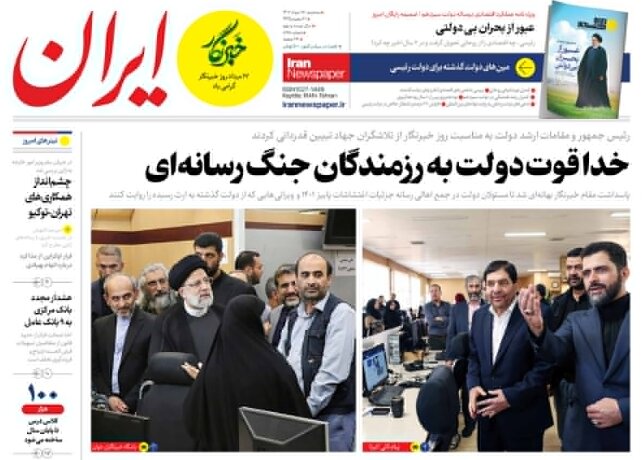Prospects of Tehran-Tokyo cooperation

In a note, the Iran newspaper discussed the foreign minister’s trip to Tokyo and wrote: In this trip, Amir Abdollahian proposed the idea of drawing up a roadmap for long-term cooperation between Iran and Japan, which will include all dimensions of bilateral, regional and international cooperation and Japan's stronger role in the region.
This trip creates a new opportunity that not only can develop the relationship between Tehran and Tokyo but also help resolve complicated issues in the region. It is an opportunity that cannot be taken advantage of without the determination of the two countries to strengthen political and economic cooperation. In the process of its foreign relations, Tokyo is searching comprehensively for security, and it has built the foundations of its political, economic, and cultural relations on the realization of its economic interests; therefore, the importance of strengthening the relationship with Iran for this country should be seen in the amount of benefit and loss that it gains from this relationship or its weakness. So, the economic factor and oil transactions have been important issues in all the ups and downs of this country's foreign policy.
Javan: London's insomnia from the IRGC power
The Europeans, who have been putting Iran's Islamic Revolutionary Guard Corps on the list of terrorist organizations for some time, started this action with tumult as if they would face no obstacles to implementing it, but over time, legal obstacles became apparent. To the extent that Josep Borrell, the head of the European Union's foreign policy, was forced to admit a few months ago: "We cannot call you a terrorist, because we don't like you. There must be a court order of a country." And now, according to what the English media has acknowledged, in this country, the positions of James Cleverly, the Secretary of Foreign Affairs, and Suella Braverman, the Home Secretary, in the context of placing the name of the IRGC on such a list have increased tensions between them. In a report published by the Financial Times, it is stated that despite Braverman's position, Cleverley is resisting this decision because he is worried about the consequences of such an action, especially since London is a member of the JCPOA; such an action will complicate the future of the revival of the nuclear agreement.
Kayhan: America can fight only if its troops are not in the range
Recently, the Western media claimed that the U.S. is sending 3,000 marines to the Persian Gulf to prevent possible seizure of commercial ships by Iran. These media in joint coordination provoke the suspicion that the presence of U.S. marines may lead to a war. This is while in the past decades when Iran lacked the current destructive capabilities, American ships did not dare to get involved in a conflict with the Iranian side even once. While the Western-oriented media is trying to reflect America's psychological operation of sending several marines to the region as a valid military threat against Iran, analysts believe that America is not capable of military confrontation with Iran even among the opposition circles. Informed domestic and foreign analysts, referring to Iran's destructive military power in the Persian Gulf and even more distant regions, say that when America sends forces to the region and puts them within the scope of Iran’s weapons the possibility of military conflict is less than in a situation that takes its forces out of range and the possibility of preparing for military conflict becomes more serious.
Sobh-e-No: Lost authority
It seems that the Americans have expressed concern about the increased cooperation between Iran, Russia and China against the global order under the leadership of the United States, Sobh-e-No said in its commentary. As stated by Andra Kendall Taylor, a senior member of the New American Security Center think tank, "These three powers seek to weaken the United States and reshape the international order." The interactive cooperation between Russia, China, and Iran increases the threats they pose to the United States of America. Experts say that Iran, Russia and China are trying to keep America's security partners like Saudi Arabia away from the global competition between the powers and in this way they are trying to weaken Washington's position. Also, China has specifically tried to attack America's influence in the Middle East through "asymmetrical tools" and show that the world is no longer an American world. These efforts have had immediate and major results on America's ability to show its power and use its influence in the world, and Iran and Beijing are clearly trying to increase their influence and reduce the influence of other powerful actors.
Leave a Comment